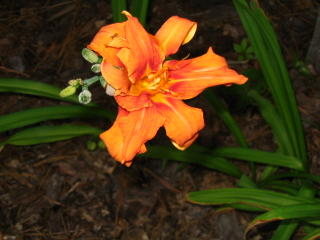Double Flowering Daylily

I bought my home two years ago in May, just as a series of daylilies was sprouting in the tiered-gardens in my side yard. I looked forward to seeing the exotic variety of flowers that I knew were planted there by the gardeners who were the previous owners of my home. It was disappointing when I discovered deer had eaten every single sprig to the ground within a week of my having moved in. Not long afterwards, once my fence had been erected in the backyard, I went out and transplanted a number of clumps of the gnawed sprouts to within the newly created sanctuary of my backyard.
I waited all through last summer with great anticipation for the beauty of their flowering. The summer came and went and the daylilies never bloomed. I soon began to grow disinterested in their survival and no longer cared what kind of flower they might have offered me upon blooming. Instead, I began to focus on the other flowering plants in my yard that offered their beauty with far less maintenance. In fact, I basically ignored the daylilies as if I were scorning them.
As this beautiful spring unfolded, each flowering plant in my yard had its moment of glory. I tried to photograph each one as a diary of the beauty that exists at my home. I had forgotten the daylilies yet again, until I had a conversation with my mom about her yard this week. She said to me "I have had the most beautiful daylilies blooming! It’s a shame that their blooms only last one day."
I replied, "Yes, it is, but then they would have had to name them something else, wouldn’t they? They call them daylilies because their blooms only last for a day. It is all the more reason to enjoy them while they are here."
That afternoon, I went outside to find, under the canopy of a cedar and a maple tree, that there were buds waiting for their day to bloom on the daylilies I had transplanted. The next day, I discovered a splayed bloom and I was sadly disappointed that it was a typical orange daylily, albeit a double-flowering variety of the type that can easily be found growing alongside the highways of eastern North Carolina. I initially reacted by thinking that I had waited for splendor and beauty and had been sorely disappointed by a common flower.
Then a thought came to mind. I thought of the energy that the plant had expended merely to survive. Deer had munched it down to the ground. I had ripped it out of its home and moved it into a new place where it competed with other plants and different levels of water and sunshine. Despite all of this adversity, it had waited, growing slowly and maturing in its new location until it had the energy to put forth its display of color and form. It was not the flower that I had expected, but it was made of the same stardust as all of us, and it deserves no less respect for its feat of survival.
I then began to think of how a parent must feel when he or she has carried the weight of expectation for the child they have reared. What if they expected a rose only to find that their child is a lowly dandelion? Or what if they expected a dandelion and discovered their child to be a daylily? In Buddhism, we know of the pain that comes from unmet expectation, known as dukha. So many of us live our lives carrying around this kind of pain for so many situations. Instead, we should learn to accept the gifts and beauty of what is given rather than to pine for that which we expected and didn’t receive.
I thought of all my compatriot gay and lesbian children who live with the scorn of their parents. The situation is so common that we have learned to create our own families of friends who are often more loyal to us than our own families are capable of being. These people accept us for the beauty we display rather than scorning us for the selfish dukha that is born of the expectation that we can never meet.
The daylilies that bloomed in my backyard suddenly took on a glorious, brilliantly colorful beauty that I hadn’t seen until I changed the way I looked at the flowers. Now I appreciate them for themselves and thank nature for the combination of form, color and matter that should be acknowledged as a true miracle of survival.
Categories: gardening photography tolerance dukha Buddhism acceptance LGBTQ Tar+Heel+Tavern Edition+19 daylilies








3 Comments:
When you suddenly see beauty in the ordinary, it is a real epiphany. It puts things in perspective. Sometimes your expectations make you blind to what is important.
This was a generous gift. Thank you.
What a beautiful post Ron. Thank you for making me smile.
Beautiful flower, beautiful post.
Post a Comment
<< Home